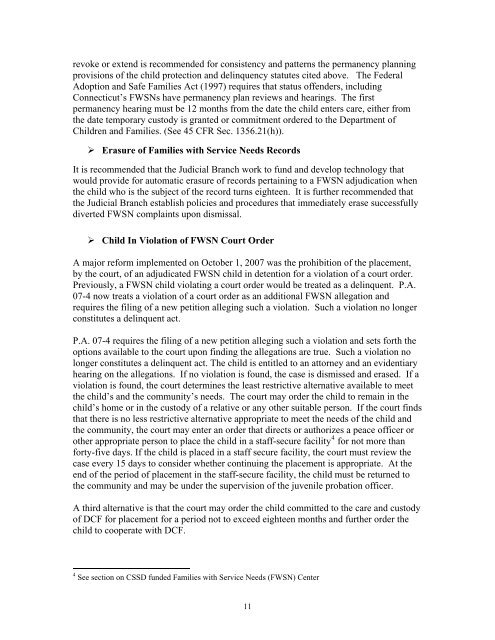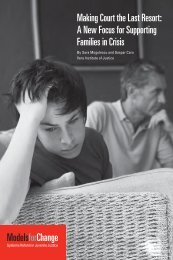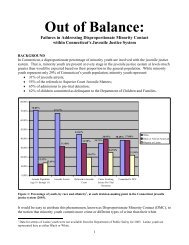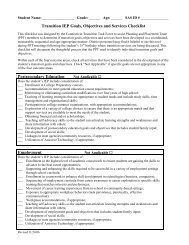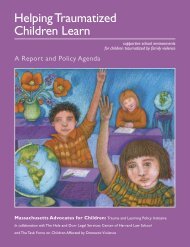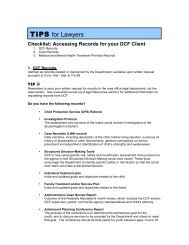FWSN-advisorybd-repo.. - The Connecticut Juvenile Justice Alliance
FWSN-advisorybd-repo.. - The Connecticut Juvenile Justice Alliance
FWSN-advisorybd-repo.. - The Connecticut Juvenile Justice Alliance
You also want an ePaper? Increase the reach of your titles
YUMPU automatically turns print PDFs into web optimized ePapers that Google loves.
evoke or extend is recommended for consistency and patterns the permanency planning<br />
provisions of the child protection and delinquency statutes cited above. <strong>The</strong> Federal<br />
Adoption and Safe Families Act (1997) requires that status offenders, including<br />
<strong>Connecticut</strong>’s <strong>FWSN</strong>s have permanency plan reviews and hearings. <strong>The</strong> first<br />
permanency hearing must be 12 months from the date the child enters care, either from<br />
the date temporary custody is granted or commitment ordered to the Department of<br />
Children and Families. (See 45 CFR Sec. 1356.21(h)).<br />
‣ Erasure of Families with Service Needs Records<br />
It is recommended that the Judicial Branch work to fund and develop technology that<br />
would provide for automatic erasure of records pertaining to a <strong>FWSN</strong> adjudication when<br />
the child who is the subject of the record turns eighteen. It is further recommended that<br />
the Judicial Branch establish policies and procedures that immediately erase successfully<br />
diverted <strong>FWSN</strong> complaints upon dismissal.<br />
‣ Child In Violation of <strong>FWSN</strong> Court Order<br />
A major reform implemented on October 1, 2007 was the prohibition of the placement,<br />
by the court, of an adjudicated <strong>FWSN</strong> child in detention for a violation of a court order.<br />
Previously, a <strong>FWSN</strong> child violating a court order would be treated as a delinquent. P.A.<br />
07-4 now treats a violation of a court order as an additional <strong>FWSN</strong> allegation and<br />
requires the filing of a new petition alleging such a violation. Such a violation no longer<br />
constitutes a delinquent act.<br />
P.A. 07-4 requires the filing of a new petition alleging such a violation and sets forth the<br />
options available to the court upon finding the allegations are true. Such a violation no<br />
longer constitutes a delinquent act. <strong>The</strong> child is entitled to an attorney and an evidentiary<br />
hearing on the allegations. If no violation is found, the case is dismissed and erased. If a<br />
violation is found, the court determines the least restrictive alternative available to meet<br />
the child’s and the community’s needs. <strong>The</strong> court may order the child to remain in the<br />
child’s home or in the custody of a relative or any other suitable person. If the court finds<br />
that there is no less restrictive alternative appropriate to meet the needs of the child and<br />
the community, the court may enter an order that directs or authorizes a peace officer or<br />
other appropriate person to place the child in a staff-secure facility 4 for not more than<br />
forty-five days. If the child is placed in a staff secure facility, the court must review the<br />
case every 15 days to consider whether continuing the placement is appropriate. At the<br />
end of the period of placement in the staff-secure facility, the child must be returned to<br />
the community and may be under the supervision of the juvenile probation officer.<br />
A third alternative is that the court may order the child committed to the care and custody<br />
of DCF for placement for a period not to exceed eighteen months and further order the<br />
child to cooperate with DCF.<br />
4 See section on CSSD funded Families with Service Needs (<strong>FWSN</strong>) Center<br />
11


